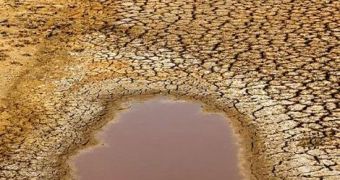It is no news that 2012 brought us some extreme weather manifestations. More precisely, new records were established in terms of average temperatures worldwide, and the US experienced a long period of drought which took its toll on national crops and water sources.
The bad news is that, according to a new report just published in the journal Nature Geoscience, such high summer and even winter temperatures are soon to become a thing of the day.
By this we mean that what we now perceive as being unfamiliar weather patterns is likely to turn into the “new normal.”
Newswise informs us that Beverly Law from the Oregon State University recently reached the conclusion that, at least as far as America is concerned, “Areas that are already dry in the West are expected to get drier. We expect more extremes.”
Furthermore, “And it's these extreme periods that can really cause ecosystem damage, lead to climate-induced mortality of forest, and may cause some areas to convert from forest into shrublands or grasslands.”
Said report also emphasizes on one very important aspect of climate change and global warming, which we discussed about on various occasions.
We are referring to the fact that, as a result of severe droughts and vegetation loss, the carbon stored within our forests up until now is beginning to make its way back into the atmosphere.
This phenomenon is bound to only aggravate present-day weather conditions.
As Beverly Law puts it, “Climatic extremes such as this will cause more large-scale droughts and forest mortality, and the ability of vegetation to sequester carbon is going to decline.”
Apparently, in western US, Canada and Mexico, the drought has already succeeded in cutting down carbon sequestration by as much as 51% over relatively large portions of land.
This report, supported by the US National Science Foundation, NASA, the US Department of Energy and similar other organizations brings troubling news indeed, and stands as proof that human society will likely experience the effects of climate change and global warming ever more often.

 14 DAY TRIAL //
14 DAY TRIAL //